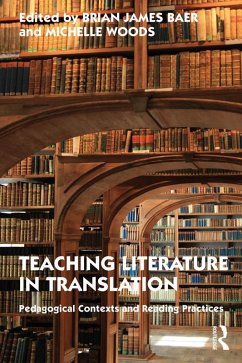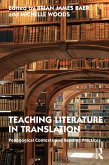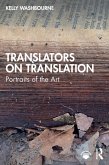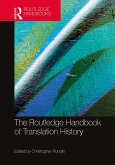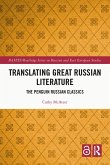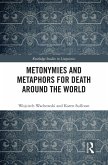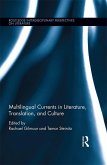Teaching Literature in Translation (eBook, ePUB)
Pedagogical Contexts and Reading Practices
Redaktion: Baer, Brian James; Woods, Michelle
44,95 €
44,95 €
inkl. MwSt.
Sofort per Download lieferbar

22 °P sammeln
44,95 €
Als Download kaufen

44,95 €
inkl. MwSt.
Sofort per Download lieferbar

22 °P sammeln
Jetzt verschenken
Alle Infos zum eBook verschenken
44,95 €
inkl. MwSt.
Sofort per Download lieferbar
Alle Infos zum eBook verschenken

22 °P sammeln
Teaching Literature in Translation (eBook, ePUB)
Pedagogical Contexts and Reading Practices
Redaktion: Baer, Brian James; Woods, Michelle
- Format: ePub
- Merkliste
- Auf die Merkliste
- Bewerten Bewerten
- Teilen
- Produkt teilen
- Produkterinnerung
- Produkterinnerung

Bitte loggen Sie sich zunächst in Ihr Kundenkonto ein oder registrieren Sie sich bei
bücher.de, um das eBook-Abo tolino select nutzen zu können.
Hier können Sie sich einloggen
Hier können Sie sich einloggen
Sie sind bereits eingeloggt. Klicken Sie auf 2. tolino select Abo, um fortzufahren.

Bitte loggen Sie sich zunächst in Ihr Kundenkonto ein oder registrieren Sie sich bei bücher.de, um das eBook-Abo tolino select nutzen zu können.
This volume presents a variety of pedagogical approaches to promote translation literacy and to address the distinct phenomenology of translated texts. It is an essential manual for all instructors and lecturers in World and Comparative Literature and Literary translation.
- Geräte: eReader
- ohne Kopierschutz
- eBook Hilfe
- Größe: 1.84MB
Andere Kunden interessierten sich auch für
![Teaching Literature in Translation (eBook, PDF) Teaching Literature in Translation (eBook, PDF)]() Teaching Literature in Translation (eBook, PDF)44,95 €
Teaching Literature in Translation (eBook, PDF)44,95 €![Translators on Translation (eBook, ePUB) Translators on Translation (eBook, ePUB)]() Kelly WashbourneTranslators on Translation (eBook, ePUB)39,95 €
Kelly WashbourneTranslators on Translation (eBook, ePUB)39,95 €![The Human Translator in the 2020s (eBook, ePUB) The Human Translator in the 2020s (eBook, ePUB)]() The Human Translator in the 2020s (eBook, ePUB)42,95 €
The Human Translator in the 2020s (eBook, ePUB)42,95 €![The Routledge Handbook of Translation History (eBook, ePUB) The Routledge Handbook of Translation History (eBook, ePUB)]() The Routledge Handbook of Translation History (eBook, ePUB)46,95 €
The Routledge Handbook of Translation History (eBook, ePUB)46,95 €![Translating Great Russian Literature (eBook, ePUB) Translating Great Russian Literature (eBook, ePUB)]() Cathy McAteerTranslating Great Russian Literature (eBook, ePUB)0,00 €
Cathy McAteerTranslating Great Russian Literature (eBook, ePUB)0,00 €![Metonymies and Metaphors for Death Around the World (eBook, ePUB) Metonymies and Metaphors for Death Around the World (eBook, ePUB)]() Wojciech WachowskiMetonymies and Metaphors for Death Around the World (eBook, ePUB)42,95 €
Wojciech WachowskiMetonymies and Metaphors for Death Around the World (eBook, ePUB)42,95 €![Multilingual Currents in Literature, Translation and Culture (eBook, ePUB) Multilingual Currents in Literature, Translation and Culture (eBook, ePUB)]() Multilingual Currents in Literature, Translation and Culture (eBook, ePUB)50,95 €
Multilingual Currents in Literature, Translation and Culture (eBook, ePUB)50,95 €-
-
-
This volume presents a variety of pedagogical approaches to promote translation literacy and to address the distinct phenomenology of translated texts. It is an essential manual for all instructors and lecturers in World and Comparative Literature and Literary translation.
Dieser Download kann aus rechtlichen Gründen nur mit Rechnungsadresse in A, B, BG, CY, CZ, D, DK, EW, E, FIN, F, GR, HR, H, IRL, I, LT, L, LR, M, NL, PL, P, R, S, SLO, SK ausgeliefert werden.
Produktdetails
- Produktdetails
- Verlag: Taylor & Francis eBooks
- Seitenzahl: 292
- Erscheinungstermin: 29. Juli 2022
- Englisch
- ISBN-13: 9781000612950
- Artikelnr.: 64150559
- Verlag: Taylor & Francis eBooks
- Seitenzahl: 292
- Erscheinungstermin: 29. Juli 2022
- Englisch
- ISBN-13: 9781000612950
- Artikelnr.: 64150559
- Herstellerkennzeichnung Die Herstellerinformationen sind derzeit nicht verfügbar.
Brian James Baer is Professor of Russian and Translation Studies at Kent State University and Leading Research Fellow at the National Research University Higher School of Economics in Moscow. His publications include the monographs Translation and the Making of Modern Russian Literature and Queer Theory and Translation Studies: Language, Politics, Desire. Michelle Woods is Professor of English at SUNY New Paltz. She is the author of Kafka Translated: How Translators Have Shaped Our Reading of Kafka, Censoring Translation: Censorship, Theatre and the Politics of Translation , and Translating Milan Kundera, and she is the editor of Authorizing Translation.
List of Contributors
Acknowledgements
Introductory Section
Is There a Translation in This Class?: A Crash Course in Translation Literacy, Brian James Baer
Bringing the Translator into the Classroom, or the Translator as Exegete, Michelle Woods
How to Use This Volume, Brian James Baer and Michelle Woods
Section I: Interrogating Key Cultural Texts: Cultural Dissonance and Stereoscopic Reading
Chapter 1: How to Make the Best of a Bad Translation: The Case of René Marqués's The Oxcart, J. Bret Maney
Chapter 2: Reading Nearby: Teaching Sa'adat Hasan Manto's "Toba Tek Singh," Akshya Saxena
Chapter 3: The Knots in the Tapestry: Teaching Translation through Don Quijote, Teaching Don Quijote through Translation, Reyes Lázaro
Chapter 4: A "Love Trap" and a Confucian Gentleman, Aili Mu
Chapter 5: "Roman, Remember": Translating Epic and Empire in Virgil's Aeneid, Neil W. Bernstein
Chapter 6: Oral Literature from an Indian Vernacular: Translating Chouboli and the Cross-dressed Storyteller from Rajasthani, Christi A. Merrill
Chapter 7: A Stereoscopic Reading of Celan's "Death Fugue," Sarah Painitz
Section II: Interrogating the Nation: Translation and/in National Languages and Literatures
Chapter 8: Translation as Bridge or Border? An Intersectional Approach to National Belonging in Kate Chopin's "La Belle Zoraïde," Javier de la Moreno-Corrales and Brian James Baer
Chapter 9: In English Translation: Teaching a Latin American Literature, Denise Kripper
Chapter 10: Reading Arabic Texts in English Translation: Lifting the "Veil," Mohammed Alzahrani
Chapter 11: Border Crossings in Graciela Limon's Translingual In Search of Bernabé, Elena Foulis
Chapter 12: Reading African Francophone Literature in Translation: Linguistic Innovation in an African Context, Kathryn Batchelor
Chapter 13: Packaging Mexico: Azuela's Los de abajo in English Translation, Daryl R. Hague
Section III: Interrogating the World: Transnational Reading and Translingual Writing
Chapter 14: Toward a Transterritorial Pedagogy: Deliberative Inquiry into Language, Identity and Difference, Oana Popescu-Sandu and Sukanya Gupta
Chapter 15: Translation and Close Reading in the General Education Seminar, Cassio de Oliveira
Chapter 16: "Every Film Is a Foreign Film:" Teaching Multilingual Cinema through Translation, Richard Watts
Chapter 17: Lost and Found in Translation: Grounding Comparative Cultural Studies, Alan Reid
Chapter 18: World Drama in Translation: In the Classroom and on the Stage, Richard Jones
Chapter 19: Coping with Misinterpretation in the World Literature Classroom, Anastasia Lakhtikova
Chapter 20 Race in Translation: An Intersectional Reading of the 1001 Nights in the World Literature Classroom, Corine Tachtiris
Chapter 21: Framed: Queer Life Writing in Translation, Brian James Baer
Section IV: Teaching Literature and Culture Through Translation
Chapter 22: Slow Reading and Empathy: Accessing Early America through Transcription and Translation, Julie A. Fisher
Chapter 23: Translating the Survey of Medieval and Renaissance French Literature, Gina L. Greco
Chapter 24: Introducing French Literature through Translation, Jena Whitaker
Chapter 25: Localizing Theory in a Spanish-Language Translation Program, María Luisa Pérez Bernardo
Index
Acknowledgements
Introductory Section
Is There a Translation in This Class?: A Crash Course in Translation Literacy, Brian James Baer
Bringing the Translator into the Classroom, or the Translator as Exegete, Michelle Woods
How to Use This Volume, Brian James Baer and Michelle Woods
Section I: Interrogating Key Cultural Texts: Cultural Dissonance and Stereoscopic Reading
Chapter 1: How to Make the Best of a Bad Translation: The Case of René Marqués's The Oxcart, J. Bret Maney
Chapter 2: Reading Nearby: Teaching Sa'adat Hasan Manto's "Toba Tek Singh," Akshya Saxena
Chapter 3: The Knots in the Tapestry: Teaching Translation through Don Quijote, Teaching Don Quijote through Translation, Reyes Lázaro
Chapter 4: A "Love Trap" and a Confucian Gentleman, Aili Mu
Chapter 5: "Roman, Remember": Translating Epic and Empire in Virgil's Aeneid, Neil W. Bernstein
Chapter 6: Oral Literature from an Indian Vernacular: Translating Chouboli and the Cross-dressed Storyteller from Rajasthani, Christi A. Merrill
Chapter 7: A Stereoscopic Reading of Celan's "Death Fugue," Sarah Painitz
Section II: Interrogating the Nation: Translation and/in National Languages and Literatures
Chapter 8: Translation as Bridge or Border? An Intersectional Approach to National Belonging in Kate Chopin's "La Belle Zoraïde," Javier de la Moreno-Corrales and Brian James Baer
Chapter 9: In English Translation: Teaching a Latin American Literature, Denise Kripper
Chapter 10: Reading Arabic Texts in English Translation: Lifting the "Veil," Mohammed Alzahrani
Chapter 11: Border Crossings in Graciela Limon's Translingual In Search of Bernabé, Elena Foulis
Chapter 12: Reading African Francophone Literature in Translation: Linguistic Innovation in an African Context, Kathryn Batchelor
Chapter 13: Packaging Mexico: Azuela's Los de abajo in English Translation, Daryl R. Hague
Section III: Interrogating the World: Transnational Reading and Translingual Writing
Chapter 14: Toward a Transterritorial Pedagogy: Deliberative Inquiry into Language, Identity and Difference, Oana Popescu-Sandu and Sukanya Gupta
Chapter 15: Translation and Close Reading in the General Education Seminar, Cassio de Oliveira
Chapter 16: "Every Film Is a Foreign Film:" Teaching Multilingual Cinema through Translation, Richard Watts
Chapter 17: Lost and Found in Translation: Grounding Comparative Cultural Studies, Alan Reid
Chapter 18: World Drama in Translation: In the Classroom and on the Stage, Richard Jones
Chapter 19: Coping with Misinterpretation in the World Literature Classroom, Anastasia Lakhtikova
Chapter 20 Race in Translation: An Intersectional Reading of the 1001 Nights in the World Literature Classroom, Corine Tachtiris
Chapter 21: Framed: Queer Life Writing in Translation, Brian James Baer
Section IV: Teaching Literature and Culture Through Translation
Chapter 22: Slow Reading and Empathy: Accessing Early America through Transcription and Translation, Julie A. Fisher
Chapter 23: Translating the Survey of Medieval and Renaissance French Literature, Gina L. Greco
Chapter 24: Introducing French Literature through Translation, Jena Whitaker
Chapter 25: Localizing Theory in a Spanish-Language Translation Program, María Luisa Pérez Bernardo
Index
List of Contributors
Acknowledgements
Introductory Section
Is There a Translation in This Class?: A Crash Course in Translation Literacy, Brian James Baer
Bringing the Translator into the Classroom, or the Translator as Exegete, Michelle Woods
How to Use This Volume, Brian James Baer and Michelle Woods
Section I: Interrogating Key Cultural Texts: Cultural Dissonance and Stereoscopic Reading
Chapter 1: How to Make the Best of a Bad Translation: The Case of René Marqués's The Oxcart, J. Bret Maney
Chapter 2: Reading Nearby: Teaching Sa'adat Hasan Manto's "Toba Tek Singh," Akshya Saxena
Chapter 3: The Knots in the Tapestry: Teaching Translation through Don Quijote, Teaching Don Quijote through Translation, Reyes Lázaro
Chapter 4: A "Love Trap" and a Confucian Gentleman, Aili Mu
Chapter 5: "Roman, Remember": Translating Epic and Empire in Virgil's Aeneid, Neil W. Bernstein
Chapter 6: Oral Literature from an Indian Vernacular: Translating Chouboli and the Cross-dressed Storyteller from Rajasthani, Christi A. Merrill
Chapter 7: A Stereoscopic Reading of Celan's "Death Fugue," Sarah Painitz
Section II: Interrogating the Nation: Translation and/in National Languages and Literatures
Chapter 8: Translation as Bridge or Border? An Intersectional Approach to National Belonging in Kate Chopin's "La Belle Zoraïde," Javier de la Moreno-Corrales and Brian James Baer
Chapter 9: In English Translation: Teaching a Latin American Literature, Denise Kripper
Chapter 10: Reading Arabic Texts in English Translation: Lifting the "Veil," Mohammed Alzahrani
Chapter 11: Border Crossings in Graciela Limon's Translingual In Search of Bernabé, Elena Foulis
Chapter 12: Reading African Francophone Literature in Translation: Linguistic Innovation in an African Context, Kathryn Batchelor
Chapter 13: Packaging Mexico: Azuela's Los de abajo in English Translation, Daryl R. Hague
Section III: Interrogating the World: Transnational Reading and Translingual Writing
Chapter 14: Toward a Transterritorial Pedagogy: Deliberative Inquiry into Language, Identity and Difference, Oana Popescu-Sandu and Sukanya Gupta
Chapter 15: Translation and Close Reading in the General Education Seminar, Cassio de Oliveira
Chapter 16: "Every Film Is a Foreign Film:" Teaching Multilingual Cinema through Translation, Richard Watts
Chapter 17: Lost and Found in Translation: Grounding Comparative Cultural Studies, Alan Reid
Chapter 18: World Drama in Translation: In the Classroom and on the Stage, Richard Jones
Chapter 19: Coping with Misinterpretation in the World Literature Classroom, Anastasia Lakhtikova
Chapter 20 Race in Translation: An Intersectional Reading of the 1001 Nights in the World Literature Classroom, Corine Tachtiris
Chapter 21: Framed: Queer Life Writing in Translation, Brian James Baer
Section IV: Teaching Literature and Culture Through Translation
Chapter 22: Slow Reading and Empathy: Accessing Early America through Transcription and Translation, Julie A. Fisher
Chapter 23: Translating the Survey of Medieval and Renaissance French Literature, Gina L. Greco
Chapter 24: Introducing French Literature through Translation, Jena Whitaker
Chapter 25: Localizing Theory in a Spanish-Language Translation Program, María Luisa Pérez Bernardo
Index
Acknowledgements
Introductory Section
Is There a Translation in This Class?: A Crash Course in Translation Literacy, Brian James Baer
Bringing the Translator into the Classroom, or the Translator as Exegete, Michelle Woods
How to Use This Volume, Brian James Baer and Michelle Woods
Section I: Interrogating Key Cultural Texts: Cultural Dissonance and Stereoscopic Reading
Chapter 1: How to Make the Best of a Bad Translation: The Case of René Marqués's The Oxcart, J. Bret Maney
Chapter 2: Reading Nearby: Teaching Sa'adat Hasan Manto's "Toba Tek Singh," Akshya Saxena
Chapter 3: The Knots in the Tapestry: Teaching Translation through Don Quijote, Teaching Don Quijote through Translation, Reyes Lázaro
Chapter 4: A "Love Trap" and a Confucian Gentleman, Aili Mu
Chapter 5: "Roman, Remember": Translating Epic and Empire in Virgil's Aeneid, Neil W. Bernstein
Chapter 6: Oral Literature from an Indian Vernacular: Translating Chouboli and the Cross-dressed Storyteller from Rajasthani, Christi A. Merrill
Chapter 7: A Stereoscopic Reading of Celan's "Death Fugue," Sarah Painitz
Section II: Interrogating the Nation: Translation and/in National Languages and Literatures
Chapter 8: Translation as Bridge or Border? An Intersectional Approach to National Belonging in Kate Chopin's "La Belle Zoraïde," Javier de la Moreno-Corrales and Brian James Baer
Chapter 9: In English Translation: Teaching a Latin American Literature, Denise Kripper
Chapter 10: Reading Arabic Texts in English Translation: Lifting the "Veil," Mohammed Alzahrani
Chapter 11: Border Crossings in Graciela Limon's Translingual In Search of Bernabé, Elena Foulis
Chapter 12: Reading African Francophone Literature in Translation: Linguistic Innovation in an African Context, Kathryn Batchelor
Chapter 13: Packaging Mexico: Azuela's Los de abajo in English Translation, Daryl R. Hague
Section III: Interrogating the World: Transnational Reading and Translingual Writing
Chapter 14: Toward a Transterritorial Pedagogy: Deliberative Inquiry into Language, Identity and Difference, Oana Popescu-Sandu and Sukanya Gupta
Chapter 15: Translation and Close Reading in the General Education Seminar, Cassio de Oliveira
Chapter 16: "Every Film Is a Foreign Film:" Teaching Multilingual Cinema through Translation, Richard Watts
Chapter 17: Lost and Found in Translation: Grounding Comparative Cultural Studies, Alan Reid
Chapter 18: World Drama in Translation: In the Classroom and on the Stage, Richard Jones
Chapter 19: Coping with Misinterpretation in the World Literature Classroom, Anastasia Lakhtikova
Chapter 20 Race in Translation: An Intersectional Reading of the 1001 Nights in the World Literature Classroom, Corine Tachtiris
Chapter 21: Framed: Queer Life Writing in Translation, Brian James Baer
Section IV: Teaching Literature and Culture Through Translation
Chapter 22: Slow Reading and Empathy: Accessing Early America through Transcription and Translation, Julie A. Fisher
Chapter 23: Translating the Survey of Medieval and Renaissance French Literature, Gina L. Greco
Chapter 24: Introducing French Literature through Translation, Jena Whitaker
Chapter 25: Localizing Theory in a Spanish-Language Translation Program, María Luisa Pérez Bernardo
Index
This is a tremendously useful addition to the bookshelf and toolkit of literature professors who teach in a global perspective-and for those who do not, it offers an excellent account of why they should. Dealing with texts from a wide variety of cultures, contributors show how attending to translation can enhance educational experience in real classroom settings.
David Bellos, Princeton University, USA
David Bellos, Princeton University, USA
